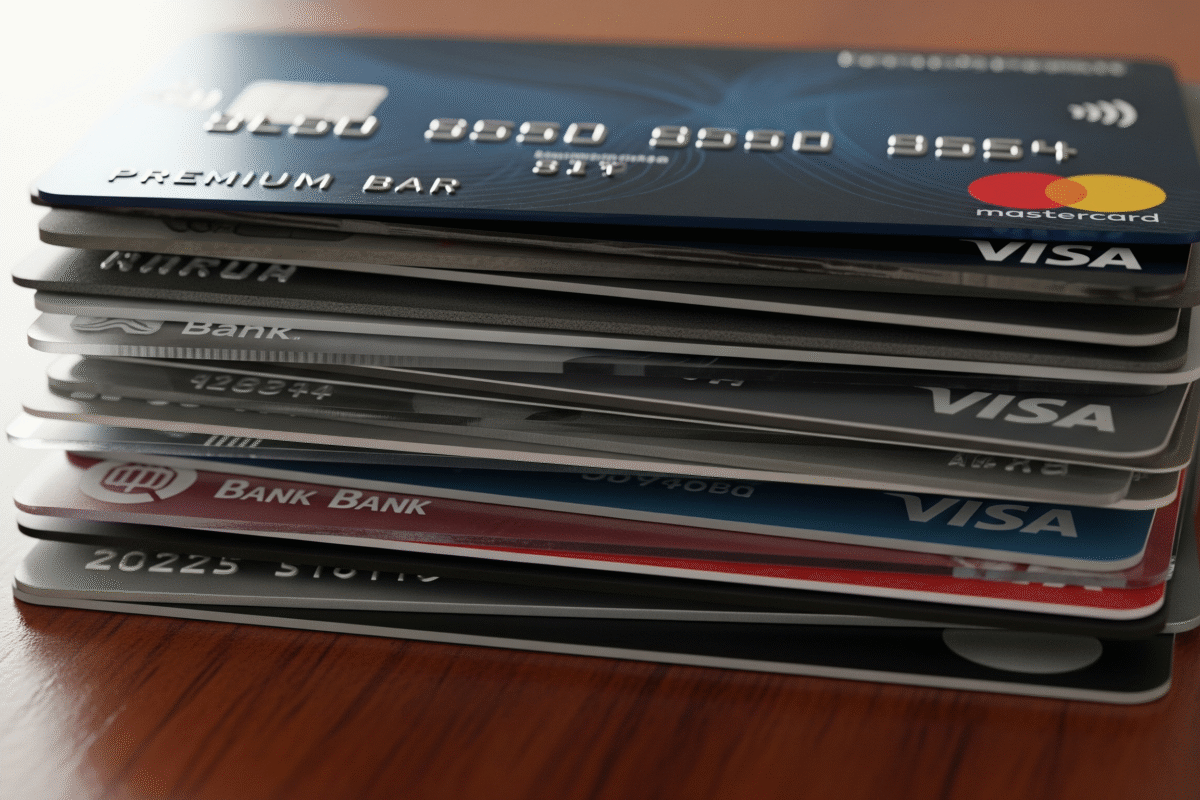How Many Credit Cards Should You Have in 2025?
How Many Credit Cards Should You Have in 2025? The Current Credit Card Conundrum
Credit cards are more than simply plastic payment methods in today’s financial environment. They are necessary for earning rewards, controlling spending, establishing credit, and even guaranteeing emergency financial stability. However, millions of Americans are still perplexed by the question: How many credit cards is a good amount to have?
The answer isn’t the same for everyone. While some financial experts suggest having at least two cards, others believe that the ideal number depends on your income, spending habits, and ability to manage debt. With over 191 million Americans owning at least one credit card, understanding the sweet spot for credit card ownership in 2025 has never been more relevant.
HSBC Cashback Credit Card 2025 – Benefits, Rewards & How to Apply?

The Significance of Credit Card Count
The quantity of credit cards in your wallet may initially appear to be a convenience issue. However, in practice, it directly affects your long-term financial health, debt management, and credit score.
VantageScore and FICO credit rating models take into account:
- Credit utilization ratio: the percentage of available credit that is utilized
- duration of credit history
- Credit mix (types of credit accounts you own)
- Payment history
Having too few or too many credit cards can work against you if you don’t manage them wisely.
The Argument in Favor of a Single Credit Card
One credit card is plenty for a lot of folks. A single card enables you to do the following if your credit is still developing:
- Create a history of payments.
- Limit your spending and don’t juggle several deadlines.
- Cut down on the desire to overspend
For novices, a basic reward card or a secured credit card is frequently the best option. However, sticking to just one card may limit your available credit and rewards opportunities.
The Case for Having Two to Three Credit Cards
Most financial experts recommend having at least two or three credit cards. Here’s why:
- Improved Credit Utilization Ratio – More available credit means you’re less likely to max out a single card, keeping your utilization low.
- Backup in Emergencies – If one card gets lost, stolen, or declined, you’ll have another option.
- Maximized Rewards – You can pair cards that offer different perks (cashback, travel rewards, gas, or groceries).
For example:
- Use one card for everyday purchases with 2% cashback.
- Use another for travel perks with airline miles.
- Keep a third as a low-interest backup.
This balance gives flexibility without overwhelming your budget.
What About Having Five or More Credit Cards?
Some seasoned cardholders proudly manage five, ten, or even more credit cards. While it can work for responsible users, it’s not ideal for everyone.
Advantages:
- Higher overall credit limits = better utilization ratio
- Access to diverse rewards programs
- Increased financial backup
Risks:
- Harder to keep track of payment due dates
- Higher risk of late payments and fees
- More hard inquiries from frequent applications
- Temptation to overspend
In short: unless you’re disciplined and financially stable, more than five cards may do more harm than good.
What is the average number of credit cards owned by Americans?
According to Experian’s 2024 Credit Report Trends, the average American has 3.9 credit cards. This number has remained steady over the past few years, even as digital wallets and buy-now-pay-later (BNPL) options grow in popularity.
Here’s a breakdown by age group:
- Gen Z (18-26): 2.5 cards
- Millennials (27-42): 3.5 cards
- Gen X (43-58): 4.5 cards
- Baby Boomers (59-77): 5+ cards
Clearly, the older you get, the more credit cards you’re likely to own—partly due to higher income and longer credit history.
The Elements That Affect the Number of Credit Cards You Should Have
The quantity of credit cards required varies from person to person. The appropriate quantity is determined by a number of individual factors:
Your Credit Score Goals
- Want to improve your score? Two to three cards with low balances can help.
- Struggling with debt? Stick to one until you’re more stable.
Your Spending Habits
- Frequent traveler? A travel rewards card is a must.
- Big on groceries and dining? Cashback cards may work better.
Your Income Level
- Higher income = easier to manage multiple cards.
- Lower income = risk of falling into debt if you juggle too many.
Your Organization Skills
- Can you track due dates, rewards, and limits easily? If not, fewer cards are safer.
How Several Credit Cards Affect Your Credit Score
Mismanagement is what lowers your credit score, not having many credit cards. They have the following effects on various scoring factors:
- Credit usage (30%): Lower usage results from more cards, which increase available credit.
- Payment History (35%) – Late payments on multiple cards can seriously damage your score.
- Length of Credit History (15%) – Opening too many new cards shortens your average account age.
- Credit Mix (10%) – Having multiple types of credit (cards, loans, mortgages) is better than relying on just one.
- New Credit (10%) – Each application triggers a hard inquiry, temporarily lowering your score.
The takeaway? Multiple cards can help your credit—if you pay on time and keep balances low.
Indications of an Excessive Credit Card Balance
Are you unsure if you’re going too far? Be mindful of these warning signs:
- You frequently overlook deadlines for payments.
- You carry balances on more than one card.
- You forget which card to use for which rewards.
- You applied for several cards within a short period.
If any of these apply, it’s time to scale back.
Tips for Managing Multiple Credit Cards
Use these successful tactics if you decide to carry multiple credit cards:
- Automate Payments – Set up autopay for at least the minimum balance to avoid late fees.
- Track Due Dates – Use calendar reminders or budgeting apps.
- Prioritize High-APR Cards – Pay off cards with higher interest first.
- Keep Old Accounts Open – Longer credit history helps your score.
- Use Rewards Strategically – Don’t overspend just to earn points.
Expert Opinions: How Many Cards Should You Really Have?
Financial advisors generally recommend:
- Beginners: 1–2 cards to start building credit.
- Average Consumers: 2–4 cards for balanced rewards and utilization.
- Frequent Travelers & High-Income Individuals: 4–6 cards, if managed responsibly.
Personal finance expert Suze Orman has warned against opening too many cards at once, while others like Dave Ramsey advise avoiding credit cards altogether. Ultimately, the best approach lies somewhere in between—using credit cards responsibly without falling into debt traps.
The Bottom Line
What is the ideal number of credit cards to own?
Your lifestyle, discipline, and financial objectives will determine the optimal amount. Two to four credit cards provide the ideal mix of benefits, security, and credit score enhancement for the majority of Americans.
Keep in mind that how you handle your cards, not how many you have, is what matters most. To achieve financial success in 2025 and beyond, make on-time payments, maintain modest balances, and handle credit wisely.
Standard Deduction vs Itemized Deductions Explained: 2025 Tax Filing Guide
Standard Deduction vs Itemized Deductions Explained: 2025 Tax Filing Guide
